I have an API route that is being refactored to use ES6 promises to avoid callback hell.
After successfully converting to a promise chain, I wanted to export my .then() functions to a separate file for cleanliness and clarity.
This works fine. However, what I'd like to do is move the functions declared in the Class constructor() function into independent methods, which can reference the values instantiated by the constructor. That way it all reads nicer.
But, when I do, I run into scoping problems - this is not defined, etc. What is the correct way to do this? Is an ES6 appropriate to use here, or should I use some other structure?
RAW CODE:
route...
.post((req, res) => {
let SubmitRouteFunctions = require('./functions/submitFunctions.js');
let fn = new SubmitRouteFunctions(req, res);
// *******************************************
// ***** THIS IS WHERE THE MAGIC HAPPENS *****
// *******************************************
Promise.all([fn.redundancyCheck, fn.getLocationInfo])
.then(fn.resetRedundantID)
.then(fn.constructSurveyResult)
.then(fn.storeResultInDB)
.then(fn.redirectToUniqueURL)
.catch((err) => {
console.log(err);
res.send("ERROR SUBMITTING YOUR RESULT: ", err);
});
})
exported functions...
module.exports = class SubmitRouteFunctions {
constructor (req, res) {
this.res = res;
this.initialData = {
answers : req.body.responses,
coreFit : req.body.coreFit,
secondFit : req.body.secondFit,
modules : req.body.modules,
};
this.newId = shortid.generate();
this.visitor = ua('UA-83723251-1', this.newId, {strictCidFormat: false}).debug();
this.clientIp = requestIp.getClientIp(req);
this.redundancyCheck = mongoose.model('Result').findOne({quizId: this.newId});
this.getLocationInfo = request.get('http://freegeoip.net/json/' + this.clientIp).catch((err) => err);
this.resetRedundantID = ([mongooseResult, clientLocationPromise]) => {
console.log(mongooseResult);
if (mongooseResult != null) {
console.log('REDUNDANT ID FOUND - GENERATING NEW ONE')
this.newId = shortid.generate();
this.visitor = ua('UA-83723251-1', this.newId, {strictCidFormat: false});
console.log('NEW ID: ', this.newId);
};
return clientLocationPromise.data;
}
this.constructSurveyResult = (clientLocation) => {
let additionalData = {quizId: this.newId, location: clientLocation};
return Object.assign({}, this.initialData, additionalData);
}
this.storeResultInDB = (newResult) => mongoose.model('Result').create(newResult).then((result) => result).catch((err) => err);
this.redirectToUniqueURL = (mongooseResult) => {
let parsedId = '?' + queryString.stringify({id: mongooseResult.quizId});
let customUrl = 'http://explore-your-fit.herokuapp.com/results' + parsedId;
this.res.send('/results' + parsedId);
}
}
}

